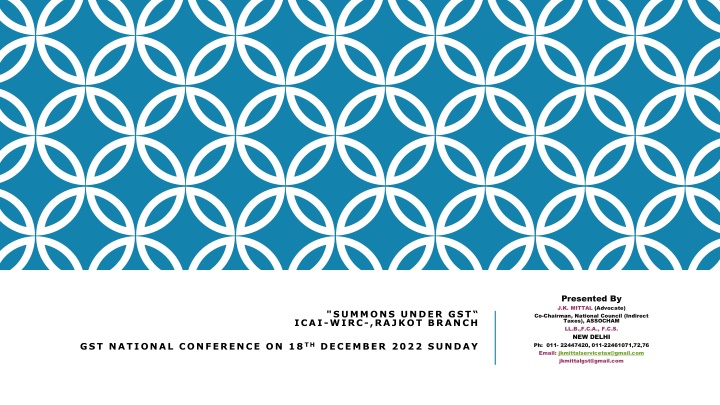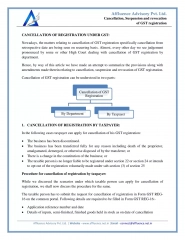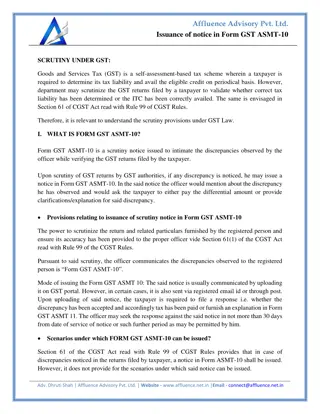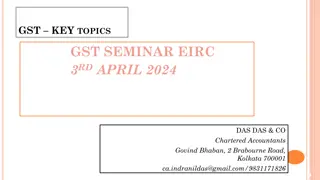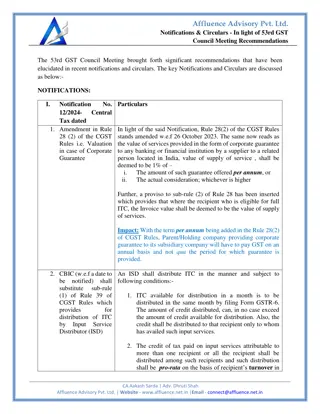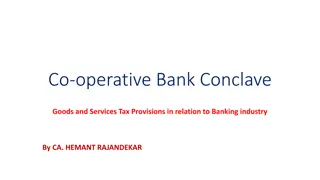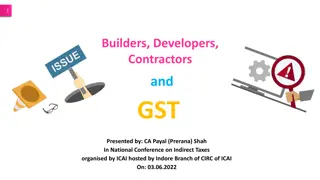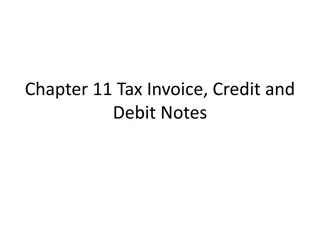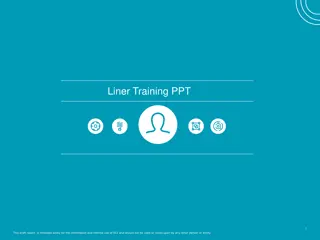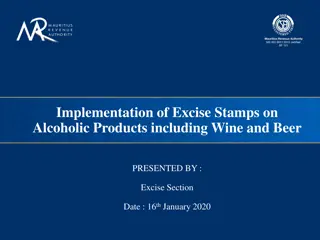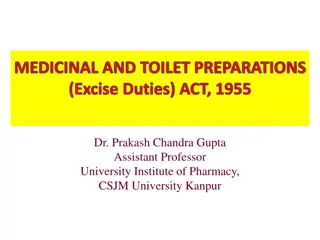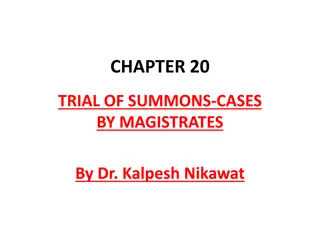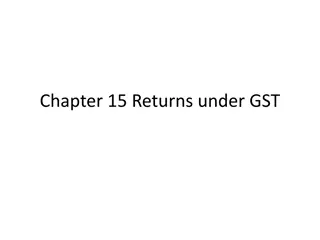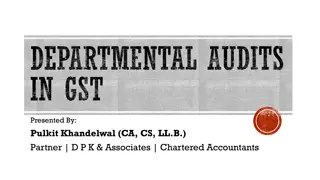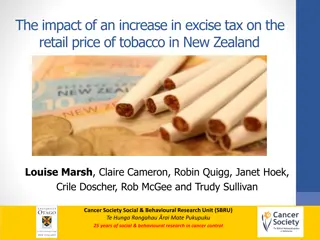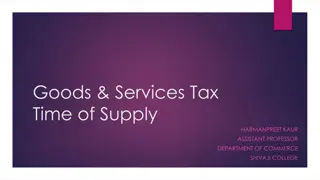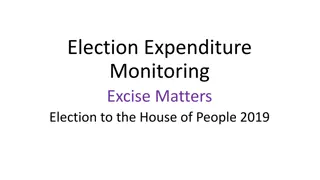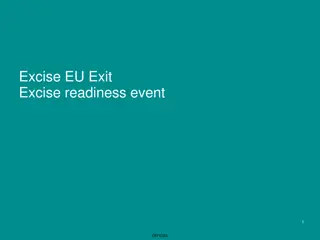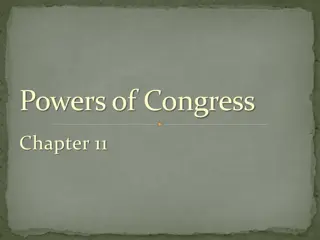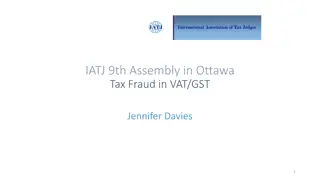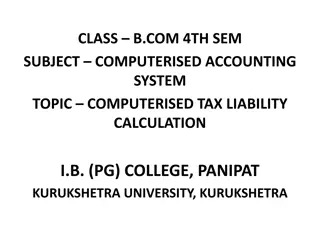Powers to Summon Persons and Produce Documents under GST and Central Excise Acts
The content discusses the power of the proper officer under the Goods and Services Tax (GST) Act and the Central Excise Act to summon individuals to provide evidence and produce documents for inquiries. It also highlights the judicial significance of such inquiries and the obligations of individuals summoned. The content emphasizes the authority granted for conducting inquiries and the applicability of relevant legal provisions.
Download Presentation

Please find below an Image/Link to download the presentation.
The content on the website is provided AS IS for your information and personal use only. It may not be sold, licensed, or shared on other websites without obtaining consent from the author.If you encounter any issues during the download, it is possible that the publisher has removed the file from their server.
You are allowed to download the files provided on this website for personal or commercial use, subject to the condition that they are used lawfully. All files are the property of their respective owners.
The content on the website is provided AS IS for your information and personal use only. It may not be sold, licensed, or shared on other websites without obtaining consent from the author.
E N D
Presentation Transcript
Presented By J.K. MITTAL (Advocate) Co-Chairman, National Council (Indirect Taxes), ASSOCHAM LL.B.,F.C.A., F.C.S. NEW DELHI Ph: 011- 22447420, 011-22461071,72,76 Email: jkmittalservicetax@gmail.com jkmittalgst@gmail.com "SUMMONS UNDER GST ICAI-WIRC-,RAJKOT BRANCH GST NATIONAL CONFERENCE ON 18THDECEMBER 2022 SUNDAY
Presented By J.K. MITTAL (Advocate) Co-Chairman, National Council (Indirect Taxes), ASSOCHAM LL.B.,F.C.A., F.C.S. NEW DELHI Ph: 011- 22447420, 011-22461071,72,76 Email: jkmittalservicetax@gmail.com jkmittalgst@gmail.com
POWER TO SUMMON PERSONS TO GIVE EVIDENCE AND PRODUCE DOCUMENTS. Section 70. Power to summon persons to give evidence and produce documents. (1) The proper officer under this Act shall have power to summon any person whose attendance he considers necessary either to give evidence or to produce a document or any other thing in any inquiry in the same manner, as provided in the case of a civil court under the provisions of the Code of Civil Procedure, 1908 (5 of 1908). (2) Every such inquiry referred to in sub-section (1) shall be deemed to be a judicial proceedings within the meaning of section 193 and section 228 of the Indian Penal Code (45 of 1860). . See Circular No. 3/3/2017, dated 5-7-2017 [Superintendent of Central Tax].
UNDER CENTRAL EXCISE ACT, 1944 Section 14. Power to summon persons to give evidence and produce documents in inquiries under this Act. (1) Any Central Excise Officer duly empowered by the Central Government in this behalf, shall have power to summon any person whose attendance he considers necessary either to give evidence or to produce a document or any other thing in any inquiry which such officer is making for any of the purposes of this Act. A summons to produce documents or other things may be for the production of certain specified documents or things or for the production of all documents or things of a certain description in the possession or under the control of the person summoned. (2) All persons so summoned shall be bound to attend, either in person or by an authorised agent, as such officer may direct; and all persons so summoned shall be bound to state the truth upon any subject respecting which they are examined or make statements and to produce such documents and other things as may be required: Provided that the exemptions under sections 132 and 133 of the Code of Civil Procedure, 1908 (5 of 1908) shall be applicable to requisitions for attendance under this section. (3) Every such inquiry as aforesaid shall be deemed to be a judicial proceeding within the meaning of section 193 and section 228 of the Indian Penal Code, 1860 (45 of 1860). Officers empowered not below the rank of Superintendent of Central Excise vide Notification No. 9/99-CE (N.T.), dated 10-2-1999. .
Modus operandi of the Department Summons are being issued indiscriminately Summons are being issued repeatedly Summons are being issued on the spot Summons are being issued deeming to empower inquiry, which contrary to law. Summons are issued by different officers in the same subject matter, which is no envisaged under the law. Summons to furnish copies/ certified copies of return already filed electronically like GSTR 3B etc. Summons to furnish documents not prepared or in possession with the taxpayers.
Summons provisions Section 70. Power to summon persons to give evidence and produce documents. (1) The proper officer under this Act shall have power to summon any person whose attendance he considers necessary either to give evidence or to produce a document or any other thing in any inquiry in the same manner, as provided in the case of a civil court under the provisions of the Code of Civil Procedure, 1908 (5 of 1908). Issues: Who can issue summons? Whether power to summons itself is power of conducting inquiry? What are the circumstances when summons can be issued? Who is the proper officer for empowering to issue summons?
Summons judgments Canon India (P.) Ltd vs Commissioner of Customs 2021 (376) ELT 3 (SC); 2021 SCC OnLine SC 200 14 when the statute directs that the proper officer can determine duty not levied/not paid, it does not mean any proper officer but that proper officer alone. In Menka Gambhir v UOI AND ORS. 2020 SCC OnLine Cal 995 : (2020) 373 ELT 604 : (2020) 2 Cal LT 158, while considering the section 108 of the Customs Act, 1962 for issuance of summons, held that: 30. Thus the necessary elements of a valid summons under Section 108 are: (a) a gazetted officer must conduct the inquiry himself; (b) the same officer must consider the attendance of the summoned necessary; and (c) the attendance must be before the same officer. EBIZ.com Pvt. Ltd. v UOI, 2016 (338) ELT 562 (Del.) [para 5]; eBiz.Com Pvt. Ltd v UOI reported in 2016 (44) STR 526 (Del.) [ para 77] - Summons to prepare reconciliations/ create other documents not backed by law, cannot be issued.
ESSENTIALS OF ISSUING SUMMONS any provisions of law of such purported inquiry; said officer under the said law, is competent to conduct said inquiry; inquiry must exist/ precede issuance of summons; section 70 itself cannot be ignition point of inquiry; Section 70(1) is like a machinery provisions which is for collection of evidence in an inquiry , therefore, it cannot be read as substantive provisions to conduct an inquiry; whose attendance he considers necessary - J. Sekar v UOI 2018 (361) E.L.T. 689 (Del.); 2018 SCC OnLine Del. 6523 72.. more importantly, it cannot be a mechanical reproduction of the words in the statute. in the same manner, as provided in the case of a civil court under the provisions of CPC, 1908. As per CPC- Every summons shall be accompanied by a copy of the plaint or, if so permitted, by a concise statement . document is preceded by a as opposed to the words documents
ESSENTIALS OF ISSUING SUMMONS CONSIDER NECESSARY In I.J. Rao, Assistant Collector v. Bibhuti Bhushan Bagh 1989 (42) E.L.T. 338 (S.C.), 13. There is no doubt that the words on sufficient cause being shown in the proviso to Section 110(2) of the Act indicates that the Collector of Customs must apply his mind to the point whether a case for extending the period of six months is made out. What is envisaged is an objective consideration of the case and a decision to be rendered after considering the material placed before him to justify the request for extension.
THE POWER OF INQUIRY DERIVED ONLY FROM SUBSTANTIVE PROVISIONS OF LAW under CGST Act, there are specific provisions have been made under which officer can exercise the power and for exercise of such powers specific FORM have been designed under the CGST Rules, 2017 on which communication shall be paid with the taxpayers and such provisions have provided certain safeguard/ reasons which such power can be exercise by the officers
LIMITATION UNDER SUMMONS Whether officer while recording Statement can he asked any questions of law or interpretation of law and agreement? No. Whether by issuing summons can an officer ask to give legal grounds ? No. Whether by issuing summons can an officer ask to prepare details ? No. includes , (i) details of services provided , (ii) details of amount collected , (iii) grounds for claiming services as export of services , etc. , EBIZ.com Pvt. Ltd. v UOI, 2016 (338) ELT 562 (Del.) wherein when the Court asked the Revenue Department/ DGCEI to point out the provision under which an assessee could be ordered to create documents, the Revenue Department could not point out any provision. it was held that: 5 .However, the DGCEI appears to have not accepted the said documents and returned them to the Petitioner insisting that the Petitioner should now give the information in a particular format. When asked to point out whether there was any provision in the law whereby an Assessee could be ordered to create documents which were not in its possession, Mr. Satish Aggarwala, learned counsel for the Respondents 2 and 3 was unable to point out any such provision The aforesaid matter, final judgment delivered on 01.09.2016, reported in eBiz.Com Pvt. Ltd v UOI reported in 2016 (44) STR 526 (Del.) wherein para 77 also dealt with the above subject matter.
OFFICERS - DUTY CONSCIOUS RATHER THAN POWER CHARGED Mahesh Chandra v Regional Manager, U.P. Financial Corporation, (1993) 2 SCC 279 categorically observed that wherever wide power is conferred by statutes on public functionaries, the same is subject to inherent limitation that it must be exercised in just, fair and reasonable manner, bona fide and in good faith; otherwise, it would be arbitrary. In such cases, test of reasonableness is stricter. The Supreme Court held that The public functionaries should be duty conscious rather than power charged. In para 15 of said judgment state that An action is mala fide if it is contrary to the purpose for which it was authorised to be exercised. Dishonesty in discharge of duty vitiates the action without anything more. An action is bad even without proof of motive of dishonesty, if the authority is found to have acted contrary to reason.
MANDATORY TO MENTION THE DOCUMENT IDENTIFICATION NUMBER (DIN) FOR ALL COMMUNICATIONS SENT BY ITS OFFICES TO TAXPAYERS Circular No. 122/41/2019-GST, dated 5-11-2019 read with Circular No. 128/47/2019- GST, dated 23-12-2019 issued by the Central Board of indirect taxes and custom which make it mandatory to mention the Document Identification Number (DIN) for all communications sent by its offices to taxpayers. In para 10 of the said circular, it is stated that It is reiterated that any specified document that is issued without the electronically generated DIN shall be treated as invalid and shall be deemed to have never been issued. The Circulars have made it clear that Document Identification Number (DIN) shall be done in respect of all communications (including e-mails) sent to taxpayers and other concerned persons by any office of the Central Board of Indirect Taxes and Customs (CBIC) across the country. There is a settled law that if the law has prescribed the things that have to be done in a particular manner, the same has to be done only in the manner prescribed or not to be done at all.[CIT v. Pearl Mech. Engg. & Foundry Works (P) Ltd., (2004) 4 SCC 597, at page 605]
DGCEI IS NOW DGGSTI/ DGGI DG, GST Intelligence (DGGSTI) is a specified wing of Department of Revenue, Ministry of Finance, which acts on specific Information of tax evasion and not for the purpose of making general enquiry regarding payment of GST. inquiry regarding payment of GST , which is only a general inquiry. roving inquiry is beyond the objectives of DGCEI.
SCN - ADJUDICATING AUTHORITY CANNOT BE DIRECTED TO FISH OUT EVIDENCE In Magma Sharchi Finance Ltd. v/s Commissioner of Service Tax Kolkata, 2017 (6) GSTL 238 (Cal.), it was held that 26 The adjudicating authority cannot be directed to fish out evidence. The Central Excise Intelligence and Investigation Manual require the SCN to be issued only after proper inquiry/investigation i.e., when the facts used are ascertained and allegations justified. The other particulars in the said Manual relied upon by the appellant also assume significance. The adjudicating authority is to adjudicate on the demand in the SCN based on the allegations made therein.
HOWSOEVER STRONG MAY BE THE SUSPICION, IT CANNOT TAKE THE PLACE OF PROOF. Krishnand vs. State of Mandharsinghji P. Jadera (2005) 281 ITR 0019, AIR 1977 SC 796, 1977 CriLJ 566, (1977) 1 SCC 816, it is held that 26 It is not enough merely to show circumstances which might create suspicion, because the court cannot decide on the basis of suspicion. It has to act on legal grounds established by evidence. Here, in the present case, no evidence at all was led on the side of the prosecution to show that the monies lying in fixed deposit in Shanti Devi's name were provided by the appellant and howsoever strong may be the suspicion of the court in this connection, it cannot take the place of proof. State(Delhi Administration) Vs. Guljari Lal TondonAIR 1979 SC 1382, 1979 CriLJ 1057, (1979) 3 SCC 316 4 There can be no doubt that the circumstances raise a serious suspicion against the respondent but suspicion however grave it may be, cannot take the place of proof.
Demand show cause notices and adjudication Section 73. Determination of tax not paid or short paid or erroneously refunded or input tax credit wrongly availed or utilised for any reason other than fraud or any wilful- misstatement or suppression of facts. (1) Where it appears to the proper officer that any tax has not been paid or short paid or erroneously refunded, or where input tax credit has been wrongly availed or utilised for any reason, other than the reason of fraud or any wilful-misstatement or suppression of facts to evade tax, he shall serve notice on the person chargeable with tax which has not been so paid or which has been so short paid or to whom the refund has erroneously been made, or who has wrongly availed or utilised input tax credit, requiring him to show cause as to why he should not pay the amount specified in the notice along with interest payable thereon under Section 50 and a penalty leviable under the provisions of this Act or the rules made thereunder.
QUOTES In the words of Mahatma Gandhi there is higher court than courts of justice and that is the court of conscienceness. It supercedes all other courts . In the words of Bhagwad Gita Says- what a great man does, is followed by others. People Go by the example he sets Thank you ..
